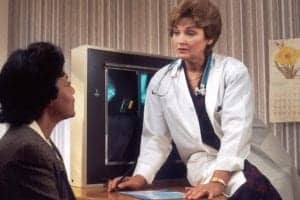What to do With a Difficult Diagnosis
 You have just returned from a visit to your doctor and she or he has given you a very difficult diagnosis.
You have just returned from a visit to your doctor and she or he has given you a very difficult diagnosis.
After experiencing several confusing and scary symptoms and suffering through many tests, you sat in her office to hear the words: “You have [__________].”
Whatever the diagnosis is, you suddenly realize life just took a u-turn on the journey you thought you were on. (Photo by Online Marketing on Unsplash)
There are so many things to do, decisions to make, people to talk to, things to learn.
You know what you are NOT going to do.
- have a celebration dinner.
- dance out the door.
- And you will not be prepared for the innumerable options that may be offered you in the days and weeks ahead.
For most of us, the first thing we do is ask…WHY ME? WHY NOW?
After being blindsided by a life-changing diagnosis, you are lucky if your mind doesn’t implode with questions and devastating scenarios as you replay all the horror stories you may have heard.
This is so normal!
Everything your physician is telling you goes through your internal filter of prior experiences with illness—how your parents and siblings handled difficult challenges when you were growing up, filters of faith, personality, and whether you are optimistic or pessimistic.
So what do we do?
At this point, we need to be gentle with ourselves… and those around us.
 Fear of the unknown can trigger grief, anger, and depression.
Fear of the unknown can trigger grief, anger, and depression.
Some of us have strong defense mechanisms that call us to respond with denial, or curiosity, or even relief that we are not as crazy as we were beginning to feel before our strange symptoms had a name.
While doctors, family, and friends, or even strangers, are quick to offer what we ‘should’ do, there is only one thing that matters at this moment.
If we forget this one thing, nothing else matters. (Photo by Aaron-Blanco on Unsplash)
Breathe!
Yes, that’s right.
Breathing is often the first sacrifice we make under the stress of hearing a diagnosis that is difficult.
When breathing becomes shallow, it increases anxiety. Directions are simple –
- Pause.
- Inhale. Count to four.
- Exhale. Count to eight.
- Rinse and repeat.
“Doing” anything in the early days of receiving difficult news can wait until you feel grounded. (Photo by Rosario-Janza on Unsplash)
How do I find this ground?
When I find myself flapping in the wind, I think of it as having lost my ‘tent pegs’. It feels as if nothing is holding me to the ground.
Tent pegs are the people, actions, or events that are unique to each person’s life, and that keeps us grounded.
 With a difficult diagnosis, it can feel as if all your tent pegs just came loose with the specter of being swept up in hurricane winds of feelings and circumstances.
With a difficult diagnosis, it can feel as if all your tent pegs just came loose with the specter of being swept up in hurricane winds of feelings and circumstances.
What are tent pegs?
Some of mine are a significant other and community of friends, a spiritual practice, photography and music, and a fulfilling job or purpose.
Add your own tent pegs to this list and ask yourself if they are as tight as you need them to be right now. (Photo by Alexandra-K on Unsplash)
If not, it’s time to pound in some of the loose stakes or even find some new ones.
You will need all the grounding you can establish.
Who else can I talk to about a Difficult Diagnosis?
 One of the more difficult aspects of the medical process is the likelihood that the physician who made this difficult diagnosis may not have particularly good conversational skills…and not nearly enough time to listen to your concerns…as often as you need to express them.(Photo by National-Cancer-Institute on Unsplash)
One of the more difficult aspects of the medical process is the likelihood that the physician who made this difficult diagnosis may not have particularly good conversational skills…and not nearly enough time to listen to your concerns…as often as you need to express them.(Photo by National-Cancer-Institute on Unsplash)
There are several professional resources available from your healthcare provider or system, but what I want to focus on is the importance of talking…somewhere…to someone.
You want someone who can listen without judgment and who can keep confidentiality.
In many relationships, that may be a significant other.
The reality is a difficult diagnosis like cancer, dementia, Parkinson’s disease, or mental illness affects them also, and they may have their own set of fears and confusion.
I’m not a talker…what do I do now?
If you are not able to find an impartial ear like a counselor or clergy person, I suggest that this may be an excellent time to begin a practice of writing in a journal if you do not do that already.
 Purchase a cheap theme book or go whole-hog with a handmade leather journal from Italy.
Purchase a cheap theme book or go whole-hog with a handmade leather journal from Italy.
Or choose an option in between.
I use an online journal called “Day One” to which there are more pros than cons.
But that is just me.
The thing about a journal is that you can say things you might not want to say to someone else, you can list questions you want to ask when you are face to face with someone, you can draw or doodle or cuss. (Photo by plush-design-studio on Unsplash)
I often choose a name for a make-believe therapist and write in dialogue.
“Dear______. I feel____ and I want____ and I don’t know____ and I believe____and I wish_____ (and so on).
Then I sit and listen. I may use a different color ink and am always astounded at the wisdom that bubbles up from my subconscious.
The beauty of a journal is that it is always there to listen to you, it doesn’t cost anything (unless you choose the handmade Italian leather) and it leaves you with a record of your journey you can return to years from now when you want to celebrate how far you have come.
What if the diagnosis is not difficult,
but wrong to begin with?
Don’t we wish!!!
Fifty years ago, before there were MRIs, PET scans and sophisticated lab tests, these diseases were diagnosed by a history of symptoms, and being misdiagnosed was a possibility.
 Today there are so many tests it is doubtful that you would be given a difficult diagnosis in error.
Today there are so many tests it is doubtful that you would be given a difficult diagnosis in error.
It is normal to entertain this possibility because it gives us breathing space as we attempt to integrate the full impact and ramifications of having a chronic or terminal illness.
Denial protects our fragile psyches from things that are threatening or downright devastating.
The flip side is that while we entertain the idea that all the lab tests and doctors are wrong, nothing is happening that may stem the onslaught of the disease process we are now living with. (Photo by Lucas-Vasques on Unsplash)
This isn’t to say that we shouldn’t seek a second…or third…opinion.
Sometimes just the personality of the physician leaves us quaking, especially if his or her manner is abrupt and focused on us making significant decisions before being able to assimilate the full impact of the diagnosis.
Another specialist or even a primary care physician may be the person who has just the right manner, or words, or support staff to help us accept the news.
What if the diagnosis is right?
Well Dang!
Let’s assume that you have a great specialist, have had the best and latest tests, and the diagnosis isn’t at all in question.
It doesn’t make anything much more comfortable, does it?
It helps to know you are not crazy because life has shifted so drastically, often without notice.
Knowing that you are not alone doesn’t do a whole lot, at least in the beginning.
After all, no one knows what you are going through, even if they have the same diagnosis.
 At the same time, you may feel as if you have stepped into a twilight zone—a zone between life and death, a zone of decreased function and loss, a zone of confusion and fear.
At the same time, you may feel as if you have stepped into a twilight zone—a zone between life and death, a zone of decreased function and loss, a zone of confusion and fear.
This is the moment before you climb back in the saddle, that you get to grieve, to cry, to go shopping for things you don’t need, or to do any number of things that may not be your usual response to challenges.
Grieving is good.
Grieving is the first step in a long process of finding your strength beneath your symptoms, your pain, your fears. (Photo by Claudia-Wolff on Unsplash)
Welcome to the first step of the long trail ahead. You are not alone.
Here are some links to other posts from The Reflective Pen that you may find useful
How to Find Time for Spiritual Practice(Opens in a new browser tab)
How to Accept an Assistive Device with Grace(Opens in a new browser tab)
If you have found this post helpful please feel free to forward it to a friend or share it on social media. Thank you. Ardis.


Nancy Emanuel
Really great article Ardis! You put lots of great thoughts into it and I appreciate it a great deal.
Ardis Mayo
Thank you, Nancy. Like most writing, it is somewhat autobiographical and I am so glad that things that were difficult in my own life can meet the need in another’s.
Lee F. White
Will hold this…and remember to offer breathing as an option…but even more to breathe myself. When I help someone with a difficult diagnosis, take a minute to breathe myself and check into my tent. Put on my own oxygen mask first.
Will be sharing this…
Ardis Mayo
I am so glad when an insight bubbles up for readers from my writing. Breathing is so basic, so organic that we often forget all about it. Mindful breathing also has helped me with a gratitude practice. I so often take it for granted!
Pingback: